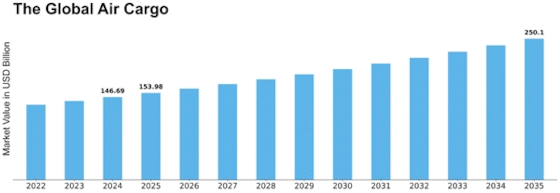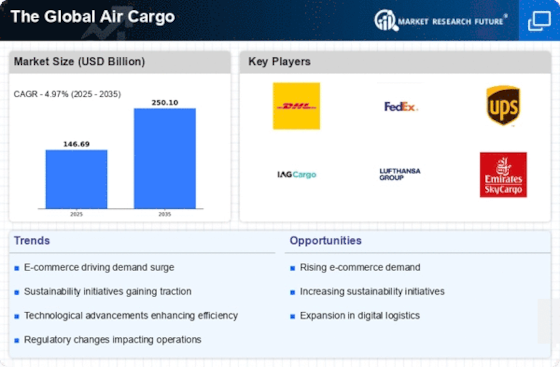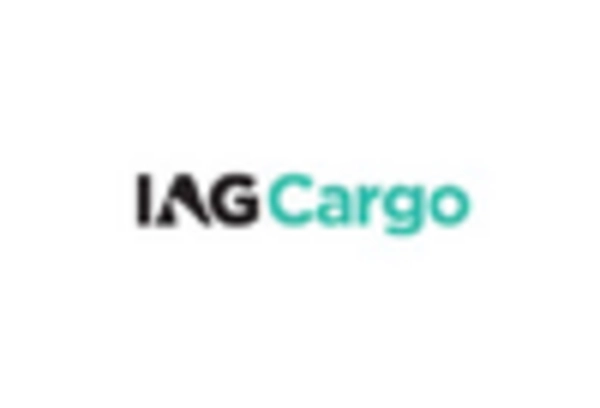-
Executive Summary
-
Market Attractiveness Analysis
- Global Air Cargo Market, by Type
- Global Air Cargo Market, by Service
- Global Air Cargo Market, by Destination
- Global Air Cargo Market, by End User
- Global Air Cargo Market, by Region
-
Market Introduction
-
Market Definition
-
Scope of the Study
-
Market Structure
-
Key Buying Criteria
-
Market Factor Indicator Analysis
-
Research Methodology
-
Research Process
-
Primary Research
-
Secondary Research
-
Market Size Estimation
-
Forecast Model
-
List of Assumptions
-
Market Insights
-
Market Dynamics
-
Introduction
-
Drivers
-
Restraints
-
Opportunities
-
Challenges
-
Market/Technological Trends
-
Patent Trends
-
Regulatory Landscape/Standards
-
Market Factor Analysis
-
Value Chain/Supply Chain Analysis
- R&D
- Manufacturing
- Distribution & Sales
- Post-Sales Monitoring
-
Porter’s Five Forces Analysis
- Threat of New Entrants
- Bargaining Power of Buyers
- Threat of Substitutes
- Rivalry
- Bargaining Power of Supplies
-
Global Air Cargo Market, by Type
-
Introduction
-
Air Freight
- Market Estimates & Forecast, 2020–2030
- Market Estimates & Forecast, by Region, 2020–2030
-
Air Mail
- Market Estimates & Forecast, 2020–2030
- Market Estimates & Forecast, by Region, 2020–2030
-
Global Air Cargo Market, by Service
-
Introduction
-
Express
- Market Estimates & Forecast, 2020–2030
- Market Estimates & Forecast, by Region, 2020–2030
-
Regular
- Market Estimates & Forecast, 2020–2030
- Market Estimates & Forecast, by Region, 2020–2030
-
Global Air Cargo Market, by Destination
-
Introduction
-
Domestic
- Market Estimates & Forecast, 2020–2030
- Market Estimates & Forecast, by Region, 2020–2030
-
International
- Market Estimates & Forecast, 2020–2030
- Market Estimates & Forecast, by Region, 2020–2030
-
Global Air Cargo Market, by End User
-
Introduction
-
Retail
- Market Estimates & Forecast, 2020–2030
- Market Estimates & Forecast, by Region, 2020–2030
-
Food & Beverages
- Market Estimates & Forecast, 2020–2030
- Market Estimates & Forecast, by Region, 2020–2030
-
Pharmaceutical & Healthcare
- Market Estimates & Forecast, 2020–2030
- Market Estimates & Forecast, by Region, 2020–2030
-
Consumer Electronics
- Market Estimates & Forecast, 2020–2030
- Market Estimates & Forecast, by Region, 2020–2030
-
Automotive
- Market Estimates & Forecast, 2020–2030
- Market Estimates & Forecast, by Region, 2020–2030
-
Others
- Market Estimates & Forecast, 2020–2030
- Market Estimates & Forecast, by Region, 2020–2030
-
Global Air Cargo Market, by Region
-
Introduction
-
North America
- Market Estimates & Forecast, by Country, 2020–2030
- Market Estimates & Forecast, by Type, 2020–2030
- Market Estimates & Forecast, by Service, 2020–2030
- Market Estimates & Forecast, by Destination, 2020–2030
- Market Estimates & Forecast, by End User, 2020–2030
- US
- Canada
-
Europe
- Market Estimates & Forecast, by Country, 2020–2030
- Market Estimates & Forecast, by Type, 2020–2030
- Market Estimates & Forecast, by Service, 2020–2030
- Market Estimates & Forecast, by Destination, 2020–2030
- Market Estimates & Forecast, by End User, 2020–2030
- UK
- Germany
- France
- Russia
- Rest of Europe
-
Asia-Pacific
- Market Estimates & Forecast, by Country, 2020–2030
- Market Estimates & Forecast, by Type, 2020–2030
- Market Estimates & Forecast, by Service, 2020–2030
- Market Estimates & Forecast, by Destination, 2020–2030
- Market Estimates & Forecast, by End User, 2020–2030
- China
- Japan
- India
- South Korea
- Rest of Asia-Pacific
-
Middle East & Africa
- Market Estimates & Forecast, by Country, 2020–2030
- Market Estimates & Forecast, by Type, 2020–2030
- Market Estimates & Forecast, by Service, 2020–2030
- Market Estimates & Forecast, by Destination, 2020–2030
- Market Estimates & Forecast, by End User, 2020–2030
- UAE
- Saudi Arabia
- Qatar
- Rest of the Middle East & Africa
-
Latin America
- Market Estimates & Forecast, by Country, 2020–2030
- Market Estimates & Forecast, by Type, 2020–2030
- Market Estimates & Forecast, by Service, 2020–2030
- Market Estimates & Forecast, by Destination, 2020–2030
- Market Estimates & Forecast, by End User, 2020–2030
- Brazil
- Rest of Latin America
-
Competitive Landscape
-
Competitive Overview
-
Competitor Dashboard
-
Major Growth Strategies in the Global Air Cargo Market
-
Competitive Benchmarking
-
Market Share Analysis
-
FedEx: The Leading Player in Terms of Number of Developments in the Global Air Cargo Market
-
Key Developments & Growth Strategies
- Product Launches/Service Deployments
- Mergers & Acquisitions
- Joint Ventures
-
Company Profiles
-
All Nippon Airways Co., Ltd
- Company Overview
- Products/Services Offered
- Financial Overview
- Key Developments
- SWOT Analysis
- Key Strategies
-
Cargolux
- Company Overview
- Products/Services Offered
- Financial Overview
- Key Developments
- SWOT Analysis
- Key Strategies
-
Cathay Pacific Airways Limited
- Company Overview
- Products/Services Offered
- Financial Overview
- Key Developments
- SWOT Analysis
- Key Strategies
-
China Eastern Airlines Corporation Limited
- Company Overview
- Products/Services Offered
- Financial Overview
- Key Developments
- SWOT Analysis
- Key Strategies
-
Deutsche Lufthansa AG
- Company Overview
- Products/Services Offered
- Financial Overview
- Key Developments
- SWOT Analysis
- Key Strategies
-
DHL International GmbH
- Company Overview
- Products/Services Offered
- Financial Overview
- Key Developments
- SWOT Analysis
- Key Strategies
-
Etihad Airways
- Company Overview
- Products/Services Offered
- Financial Overview
- Key Developments
- SWOT Analysis
- Key Strategies
-
FedEx
- Company Overview
- Products/Services Offered
- Financial Overview
- Key Developments
- SWOT Analysis
- Key Strategies
-
International Consolidated Airlines Group, SA.
- Company Overview
- Products/Services Offered
- Financial Overview
- Key Developments
- SWOT Analysis
- Key Strategies
-
Japan Airlines
- Company Overview
- Products/Services Offered
- Financial Overview
- Key Developments
- SWOT Analysis
- Key Strategies
-
Korean Air
- Company Overview
- Products/Services Offered
- Financial Overview
- Key Developments
- SWOT Analysis
- Key Strategies
-
Singapore Airlines
- Company Overview
- Products/Services Offered
- Financial Overview
- Key Developments
- SWOT Analysis
- Key Strategies
-
The Emirates Group
- Company Overview
- Products/Services Offered
- Financial Overview
- Key Developments
- SWOT Analysis
- Key Strategies
-
United Parcel Service of America, Inc.
- Company Overview
- Products/Services Offered
- Financial Overview
- Key Developments
- SWOT Analysis
- Key Strategies
-
Qatar Airways
- Company Overview
- Products/Services Offered
- Financial Overview
- Key Developments
- SWOT Analysis
- Key Strategies
-
Appendix
-
References
-
Related Reports
-
List of Abbreviations
-
Industry Insights
-
Note: This table of contents is tentative and subject to change as the research progresses.
-
List of Tables
-
Global Air Cargo Market, by Region, 2020–2030
-
North America: Air Cargo Market, by Country, 2020–2030
-
Europe: Air Cargo Market, by Country, 2020–2030
-
Asia-Pacific: Air Cargo Market, by Country, 2020–2030
-
Middle East & Africa: Air Cargo Market, by Country, 2020–2030
-
Latin America: Air Cargo Market, by Country, 2020–2030
-
Global Air Cargo Market Size, by Region, 2020–2030
-
North America: Air Cargo Market Size, by Country, 2020–2030
-
Europe: Air Cargo Market Size, by Country, 2020–2030
-
Asia-Pacific: Air Cargo Market Size, by Country, 2020–2030
-
Middle East & Africa: Air Cargo Market Size, by Country, 2020–2030
-
Latin America: Air Cargo Market Size, by Country, 2020–2030
-
Global Air Cargo Type Market, by Region, 2020–2030
-
North America: Air Cargo Type Market, by Country, 2020–2030
-
Europe: Air Cargo Type Market, by Country, 2020–2030
-
Asia-Pacific: Air Cargo Type Market, by Country, 2020–2030
-
Middle East & Africa: Air Cargo Type Market, by Country, 2020–2030
-
Latin America: Air Cargo Type Market, by Country, 2020–2030
-
Global Air Cargo Service Market, by Region, 2020–2030
-
North America: Air Cargo Service Market, by Country, 2020–2030
-
Europe: Air Cargo Service Market, by Country, 2020–2030
-
Asia-Pacific: Air Cargo Service Market, by Country, 2020–2030
-
Middle East & Africa: Air Cargo Service Market, by Country, 2020–2030
-
Latin America: Air Cargo Service Market, by Country, 2020–2030
-
Global Air Cargo Destination Market, by Region, 2020–2030
-
North America: Air Cargo Destination Market, by Country, 2020–2030
-
Europe: Air Cargo Destination Market, by Country, 2020–2030
-
Asia-Pacific: Air Cargo Destination Market, by Country, 2020–2030
-
Middle East & Africa: Air Cargo Destination Market, by Country, 2020–2030
-
Latin America: Air Cargo Destination Market, by Country, 2020–2030
-
Global Air Cargo End User Market, by Region, 2020–2030
-
North America: Air Cargo End User Market, by Country, 2020–2030
-
Europe: Air Cargo End User Market, by Country, 2020–2030
-
Asia-Pacific: Air Cargo End User Market, by Country, 2020–2030
-
Middle East & Africa: Air Cargo End User Market, by Country, 2020–2030
-
Latin America: Air Cargo End User Market, by Country, 2020–2030
-
Global Air Cargo Market, by Region, 2020–2030
-
Global Air Cargo Market, by Type, 2020–2030
-
Global Air Cargo Market, by Service, 2020–2030
-
Global Air Cargo Market, by Destination, 2020–2030
-
Global Air Cargo Market, by End User, 2020–2030
-
North America: Air Cargo Market, by Country, 2020–2030
-
North America: Air Cargo Market, by Type, 2020–2030
-
North America: Air Cargo Market, by Service, 2020–2030
-
North America: Air Cargo Market, by Destination, 2020–2030
-
North America: Air Cargo Market, by End User, 2020–2030
-
Europe: Air Cargo Market, by Country, 2020–2030
-
Europe: Air Cargo Market, by Type, 2020–2030
-
Europe: Air Cargo Market, by Service, 2020–2030
-
Europe: Air Cargo Market, by Destination, 2020–2030
-
Europe: Air Cargo Market, by End User, 2020–2030
-
Asia-Pacific: Air Cargo Market, by Country, 2020–2030
-
Asia-Pacific: Air Cargo Market, by Type, 2020–2030
-
Asia-Pacific: Air Cargo Market, by Service, 2020–2030
-
Asia-Pacific: Air Cargo Market, by Destination, 2020–2030
-
Asia-Pacific: Air Cargo Market, by End User, 2020–2030
-
Middle East & Africa: Air Cargo Market, by Country, 2020–2030
-
Middle East & Africa: Air Cargo Market, by Type, 2020–2030
-
Middle East & Africa: Air Cargo Market, by Service, 2020–2030
-
Middle East & Africa: Air Cargo Market, by Destination, 2020–2030
-
Middle East & Africa: Air Cargo Market, by End User, 2020–2030
-
Latin America: Air Cargo Market, by Country, 2020–2030
-
Latin America: Air Cargo Market, by Type, 2020–2030
-
Latin America: Air Cargo Market, by Service, 2020–2030
-
Latin America: Air Cargo Market, by Destination, 2020–2030
-
Latin America: Air Cargo Market, by End User, 2020–2030
-
-
List of Figures
-
Research Process of MRFR
-
Top-Down & Bottom-Up Approaches
-
Market Dynamics
-
Impact Analysis: Market Drivers
-
Impact Analysis: Market Restraints
-
Porter's Five Forces Analysis
-
Value Chain Analysis
-
Global Air Cargo Market Share, by Type, 2020 (%)
-
Global Air Cargo Market, by Type, 2020–2030 (USD Million)
-
Global Air Cargo Market Share, by Service, 2020 (%)
-
Global Air Cargo Market, by Service, 2020–2030 (USD Million)
-
Global Air Cargo Market Share, by Destination, 2020 (%)
-
Global Air Cargo Market, by Destination, 2020–2030 (USD Million)
-
Global Air Cargo Market Share, by End User, 2020 (%)
-
Global Air Cargo Market, by End User, 2020–2030 (USD Million)
-
Global Air Cargo Market Share (%), by Region, 2020
-
Global Air Cargo Market, by Region, 2020–2030 (USD Million)
-
North America: Air Cargo Market Share (%), 2020
-
North America: Air Cargo Market, by Country, 2020–2030 (USD Million)
-
Europe: Air Cargo Market Share (%), 2020
-
Europe: Air Cargo Market, by Country, 2020–2030 (USD Million)
-
Asia-Pacific: Air Cargo Market Share (%), 2020
-
Asia-Pacific: Air Cargo Market, by Country, 2020–2030 (USD Million)
-
Middle East & Africa: Air Cargo Market Share (%), 2020
-
Middle East & Africa: Air Cargo Market, by Region, 2020–2030 (USD Million)
-
Latin America: Air Cargo Market Share (%), 2020
-
Latin America: Air Cargo Market, by Region, 2020–2030 (USD Million)



















Leave a Comment